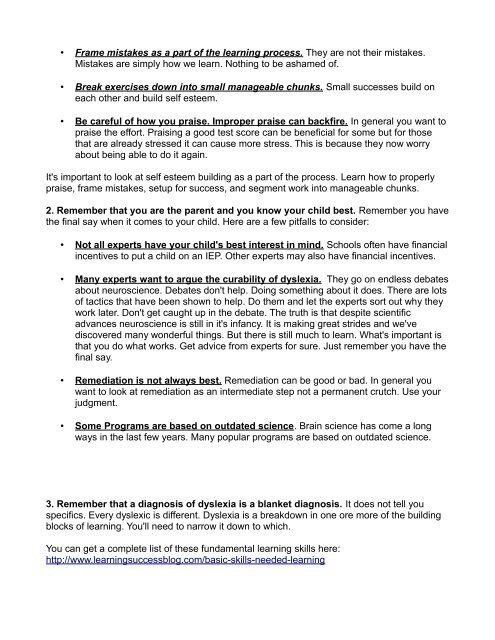Overcoming Dyslexia
Overcoming Dyslexia
Overcoming Dyslexia
You also want an ePaper? Increase the reach of your titles
YUMPU automatically turns print PDFs into web optimized ePapers that Google loves.
• Frame mistakes as a part of the learning process. They are not their mistakes.<br />
Mistakes are simply how we learn. Nothing to be ashamed of.<br />
• Break exercises down into small manageable chunks. Small successes build on<br />
each other and build self esteem.<br />
• Be careful of how you praise. Improper praise can backfire. In general you want to<br />
praise the effort. Praising a good test score can be beneficial for some but for those<br />
that are already stressed it can cause more stress. This is because they now worry<br />
about being able to do it again.<br />
It's important to look at self esteem building as a part of the process. Learn how to properly<br />
praise, frame mistakes, setup for success, and segment work into manageable chunks.<br />
2. Remember that you are the parent and you know your child best. Remember you have<br />
the final say when it comes to your child. Here are a few pitfalls to consider:<br />
• Not all experts have your child's best interest in mind. Schools often have financial<br />
incentives to put a child on an IEP. Other experts may also have financial incentives.<br />
• Many experts want to argue the curability of dyslexia. They go on endless debates<br />
about neuroscience. Debates don't help. Doing something about it does. There are lots<br />
of tactics that have been shown to help. Do them and let the experts sort out why they<br />
work later. Don't get caught up in the debate. The truth is that despite scientific<br />
advances neuroscience is still in it's infancy. It is making great strides and we've<br />
discovered many wonderful things. But there is still much to learn. What's important is<br />
that you do what works. Get advice from experts for sure. Just remember you have the<br />
final say.<br />
• Remediation is not always best. Remediation can be good or bad. In general you<br />
want to look at remediation as an intermediate step not a permanent crutch. Use your<br />
judgment.<br />
• Some Programs are based on outdated science. Brain science has come a long<br />
ways in the last few years. Many popular programs are based on outdated science.<br />
3. Remember that a diagnosis of dyslexia is a blanket diagnosis. It does not tell you<br />
specifics. Every dyslexic is different. <strong>Dyslexia</strong> is a breakdown in one ore more of the building<br />
blocks of learning. You'll need to narrow it down to which.<br />
You can get a complete list of these fundamental learning skills here:<br />
http://www.learningsuccessblog.com/basic-skills-needed-learning

















